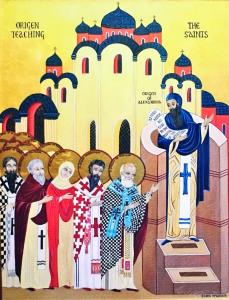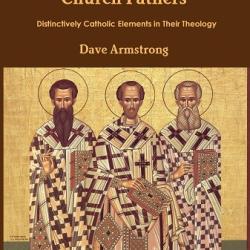Reformed Protestant apologist “Turretinfan” (words in blue below) wrote an article entitled, How does “Read Your Bible” Translate into “Formal Sufficiency”? (1-14-20). One can’t tell from the title, but it’s about the views of Origen (c. 184 – c. 253) regarding the rule of faith, supposed formal sufficiency of Scripture (i.e., it alone being necessary for the understanding of itself and for doctrine), and sola Scriptura (i.e., the Bible is the only infallible source of Christian truth).
Turretinfan scrounges up two citations that he thinks nails down his case for Origen believing distinctly “non-Catholic” things; introducing them by stating: “How does Origen teach the formal sufficiency of Scripture?”:
Our mind is renewed through training in wisdom and meditation upon the Word of God, and the spiritual interpretation of his law. And to the extent it makes daily progress by reading the Scriptures, to the extent that its understanding goes deeper, to that extent it becomes continuously new and daily new. I do not know if anyone can be renewed who is lazy in respect to the Holy Scriptures and training in spiritual understanding, by which it becomes possible not only to understand what has been written, but also to explain more clearly and to reveal more carefully. (Thomas Scheck’s translation, in Origen: Commentary on the Epistle to the Romans, Books 6-10 [Volume 2, Book 9, chapter 1, section 12, p. 196]; commenting on Romans 12:2; published by The Catholic University of America Press, 2002)
Now the cause, in all the points previously enumerated, of the false opinions, and of the impious statements or ignorant assertions about God, appears to be nothing else than the not understanding the Scripture according to its spiritual meaning, but the interpretation of it agreeably to the mere letter. And therefore, to those who believe that the sacred books are not the compositions of men, but that they were composed by inspiration of the Holy Spirit, agreeably to the will of the Father of all things through Jesus Christ, and that they have come down to us, we must point out the ways (of interpreting them) which appear (correct) to us, who cling to the standard of the heavenly Church of Jesus Christ according to the succession of the apostles. (On First Principles, Book IV, Section 9; English translation based on extant Greek of Origen)
The way, then, as it appears to us, in which we ought to deal with the Scriptures, and extract from them their meaning, is the following, which has been ascertained from the Scriptures themselves. (Ibid., section 11)
Tuuretinfan makes further comments on these passages:
Whichever sense you land on, Origen does not simply mean “go ask the church what the text means . . .
Interestingly, it’s quite possible to adopt both the “rule of faith” position and the canon of Scripture position simultaneously, if the Scripture is self-interpreting and the rule of faith for the church, and if the Scriptures were handed down by the apostles and those that followed them. . . .
So, it is not that there is a deficiency in the form of Scripture that must be made up by the church, but rather the Scriptures themselves provide the key to their understanding. And that’s, of course, one of the key principles of formal sufficiency: Scripture interprets Scripture. . . .
If reading Scripture is the way we renew our mind, this implies that Scripture does not merely contain revelation, but that it does so in a form that permits our proper understanding of it. In other words, the Scriptures are formally sufficient. Obviously, a person can inconsistently advise us to read our Bibles, even while teaching that the church has the final say . . ., but on its face every statement that affirms that reading the Scriptures is the way to make progress in the Christian life is an affirmation of the formal sufficiency of Scripture.
As in all such cases, one must also determine what the writer believes about the Church and Christian tradition, because the rule of faith has to do with the relationship of those two entities with Scripture. We already see that Origen, in the second excerpt above, incorporates the Church and apostolic succession into the mix (“who cling to the standard of the heavenly Church of Jesus Christ according to the succession of the apostles”), so that he is expressing the Catholic “three-legged stool” view.
Turretinfan simply ignores this section and goes on his merry way, classically exhibiting the usual Protestant “see no evil” tunnel vision in these matters. This is rather unimpressive.
The word “standard” is particularly noteworthy and revealing. Church and tradition/ apostolic succession are involved in the rule of faith alongside Holy Scripture. All we need do now is supplement the above with other related utterances from Origen, and reputable Protestant scholarly opinion. Origen also wrote the following:
Since many, however, of those who profess to believe in Christ differ from each other, not only in small and trifling matters, but also on subjects of the highest importance, as, e.g., regarding God, or the Lord Jesus Christ, or the Holy Spirit; and not only regarding these, but also regarding others which are created existences, viz., the powers and the holy virtues; it seems on that account necessary first of all to fix a definite limit and to lay down an unmistakable rule regarding each one of these, and then to pass to the investigation of other points. For as we ceased to seek for truth (notwithstanding the professions of many among Greeks and Barbarians to make it known) among all who claimed it for erroneous opinions, after we had come to believe that Christ was the Son of God, and were persuaded that we must learn it from Himself; so, seeing there are many who think they hold the opinions of Christ, and yet some of these think differently from their predecessors, yet as the teaching of the Church, transmitted in orderly succession from the apostles, and remaining in the Churches to the present day, is still preserved, that alone is to be accepted as truth which differs in no respect from ecclesiastical and apostolical tradition. (De Principiis, preface, complete section 2; ANF, Vol. IV)
Origen, in this Preface, reiterates over and over the same non-scriptural elements of the rule of faith: “the teaching of the apostles” (4), “most clearly taught throughout the Churches” (4), “the apostolic teaching” (5), “This also is clearly defined in the teaching of the Church” (5), “the teaching of the Church” (again in 5, and in 6, 7, 10), “the Church’s teaching” (7), “Respecting which there is one opinion throughout the whole Church” (8). He continues on in the same manner throughout this work:
“he may judge these to be heretical and opposed to the faith of the Church” (Bk. I, ch. 7, part 1); “We have now to ascertain what those matters are which it is proper to treat in the following pages according to our dogmatic belief, i.e., in agreement with the creed of the Church” (Bk. I, ch. 7, part 1). “the punishments of sinners, according to the threatenings of holy Scripture and the contents of the Church’s teaching”; “some take offense at the creed of the Church” (Bk. II, ch. 10, part 1), “Those, however, who receive the representations of Scripture according to the understanding of the apostles, . . . (Bk. II, ch. 11, part 3).
Therefore, it is apparent that Origen held to the Catholic rule of faith and apostolic succession, and that he denied sola Scriptura.
Protestant historian J. N. D. Kelly describes Origen’s view of the relationship of the Bible and tradition:
Early third-century writers, like Clement of Alexandria and Origen, continued to use language about it [tradition, in context] closely akin to that of Irenaeus and Tertullian, and spoke of ‘the ecclesiastical canon’ or ‘the canon of faith’ . . . in addition to the Church’s public tradition, they believed they had access to a secret tradition of doctrine . . . for Origen it seems to have consisted of an esoteric theology based on the Bible . . . According to Origen, the rule of faith, or canon, was the body of beliefs currently accepted by ordinary Christians; or again it could stand for the whole content of the faith. In his usage it was equivalent to what he called ‘the ecclesiastical preaching’ . . . and he meant by it the Christian faith as taught in the Church of his day and handed down from the apostles. Though its contents coincided with those of the Bible, it was formally independent of the Bible, and also included the principles of Biblical interpretation. (Early Christian Doctrines, San Francisco: Harper & Row, fifth revised edition, 1978, 43)
Kelly’s last sentence describes almost exactly the Catholic distinction between material and formal sufficiency of Scripture. We agree with Protestants that Scripture is materially sufficient, but not formally sufficient as a rule of faith, independently of Church and Tradition.
***


















